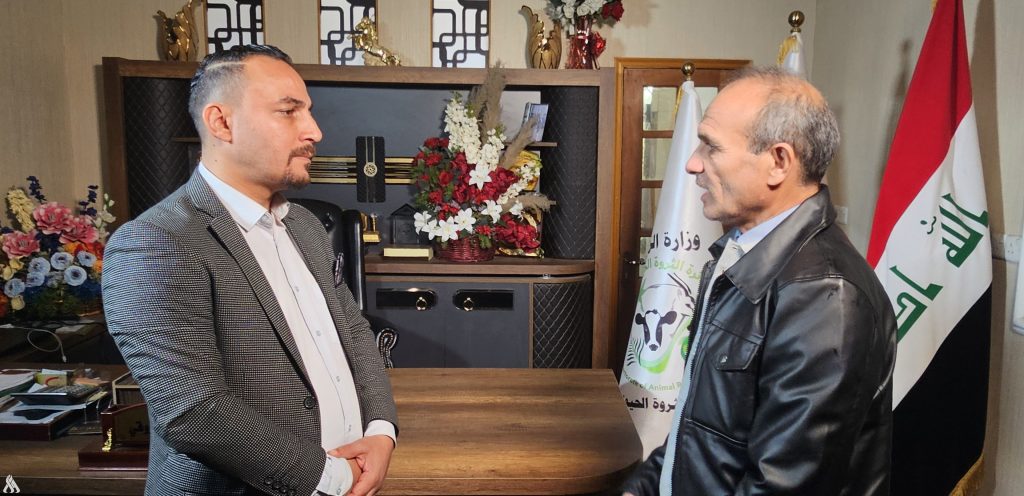
Baghdad – IA – Muhammad Salim
Photography: Ward Abdel Amir
To receive more news, subscribe to our channel on Telegram
Today, Wednesday, the Department of Livestock at the Ministry of Agriculture announced a new drop in meat prices, while clarifying the mechanism and conditions for importing livestock. It confirmed that the Holy Karbala Poultry Project covers 30% of the market’s need for eggs.
The Director General of the Department, Walid Muhammad, confirmed in an interview with the Iraqi News Agency (INA) that “the reason for the high prices of red meat in Iraqi markets is mainly due to the Iraqi consumer’s desire for local sheep and the presence of purchasing power for some citizens to buy this meat, which led to an increase in demand for it.” Therefore, the rise in prices came due to the scarcity of sheep and livestock in the country.”
He added, “The Ministry has taken many measures to reduce prices, the most important of which is opening imports of live and frozen livestock,” noting that “the current rise in meat prices is unjustified.”
He continued, “The Ministry, through the opinion committee and the recommendation of the Livestock Department, allowed the import of live animals for the purposes of breeding and slaughter, which are from multiple origins and have high-quality specifications.”
Controls on importing livestock for breeding
Regarding import controls, Muhammad explained, “The Ministry and the Department of Livestock have established controls and standards for importing livestock for breeding, as these livestock must be of high specifications and from approved origins, have genetic performance and high educational value, and have a health certificate and a pedigree certificate,” indicating that “this procedure It is followed globally, and Iraq is now following in those footsteps.”
He stated that “genetics has a major role, but the environment is distorted by genetic factors, whether positively or negatively. If the livestock are from countries characterized by a moderate climate and standard health conditions, the same atmosphere must be provided. If it is not provided, the required genetic performance will not be achieved.”
Importing meat from international origins
Muhammad said during the interview: “We will ask the Ministry of Commerce to go towards importing frozen meat from countries known for their abundant production of animals, especially sheep, such as Australia, which does not allow the export of live animals, especially to some Middle Eastern countries, due to their strict standards in terms of animal welfare and animal rights, which forces people to buy animals.” Or whole frozen carcasses of high quality and competitive prices. If the Iraqi citizen goes to buy this meat, the pressure on local animals or meat will be reduced, and thus the supply may increase and the costs may decrease.”
Support livestock breeders
Regarding supporting livestock breeders, the Director General of Livestock said, “The Ministry has taken bold decisions to support livestock breeders by maintaining the import of yellow corn, which is a very important feed material, and other feed materials whose prices are lower than local ones, and the netting rate is 50%, which is evidence.” This will lead to a reduction in the price of feed, support to livestock breeders, and a decrease in meat prices.”
Encouraging investment
Muhammad stressed, “The door to investment is open and ongoing at the Ministry of Agriculture and the Department of Livestock encourages investment in all sectors of livestock, which include livestock of all kinds, poultry birds, and broiler chickens, and the Ministry is ready to support all projects for all types of poultry birds such as ostriches, turkeys, and quails.”
Poultry prices rise
He stated that “the rise in poultry prices is due to the scarcity of broilers due to the limited supply of hatching eggs,” noting that “the countries from which Iraq imports some poultry, most of them are infected with bird flu, and therefore imports from those countries are prohibited, and this is one of the reasons that led to the scarcity, in addition to the fact that projects Hatching eggs do not cover the local need.”
He pointed out that “the Holy Karbala poultry project is an important project and can cover part of the demand, which amounts to approximately 30% of the local market’s need for hatching eggs.” Another reason is that “energy costs for broiler breeders are very low during this period of the year because this winter is mild, which prompts them to keep broilers for a longer period and not market them,” stressing that “the Ministry and the Department of Livestock have put in place treatments by providing imported chicken clips.” Its prices are very suitable for the consumer.”
Fish prices rise
Regarding the significant increase in fish prices, the Director-General of the Department of Animal Wealth attributed the reasons to “filling in unsanctioned mud lakes, the number of which is considered greater than the sanctioned lakes.” He stressed that “Agriculture asked the relevant ministries to stop filling the illegal lakes until the end of December, after they were scheduled to be filled in July due to water scarcity. In addition, some fish breeders are reluctance to take all their goods to the markets due to the favorable climate and low feed prices, which… It prompts them to keep fish in the lakes for longer periods, knowing that the decline in fish feed prices compared to last year should be part of the solution and not the problem.”
Yesterday evening, Tuesday, Prime Minister Muhammad Shiaa Al-Sudani issued several directives on the occasion of the advent of the month of Ramadan, during the Council of Ministers session, including the continuation and strengthening of the measures taken by the Ministries of Trade and Agriculture, to confront the rise in meat prices and reduce their impact on citizens, as well as strengthening the ration card and the food basket. With additional vocabulary; To ease the burden on citizens.


